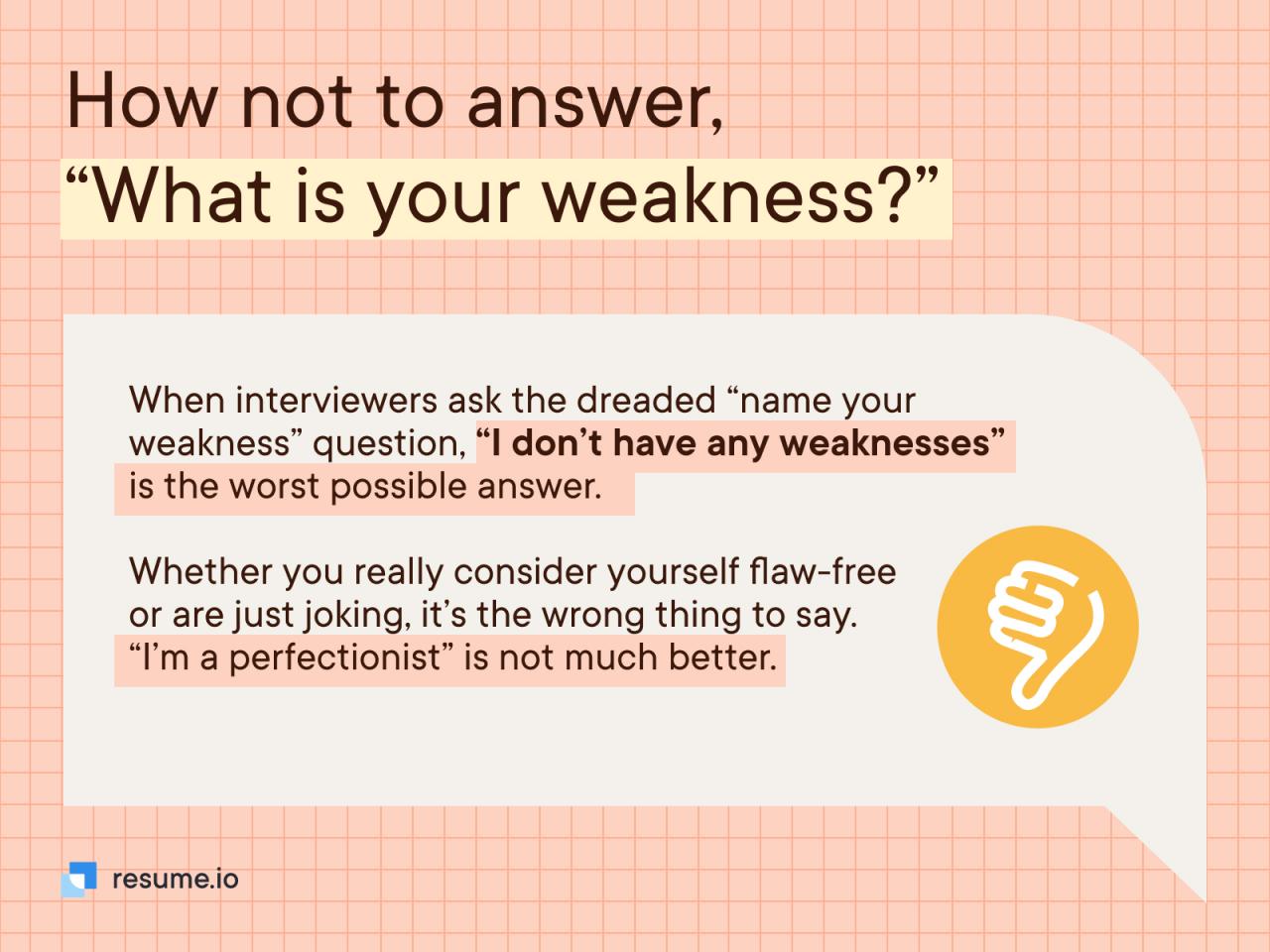Answer to what are your weaknesses in an interview – When faced with the dreaded “What are your weaknesses?” question in an interview, honesty and self-reflection are crucial. By understanding your shortcomings and presenting them as opportunities for growth, you can turn a potential pitfall into a chance to showcase your strengths.
Common weaknesses candidates encounter include lack of experience, difficulty with time management, or communication challenges. Addressing these concerns requires a positive and professional approach, highlighting your willingness to improve and learn.
Answering “What Are Your Weaknesses?” in an Interview
In the American pop culture lexicon, “owning your weaknesses” has become a ubiquitous mantra. From self-help gurus to career counselors, the message is clear: honesty and self-reflection are crucial for personal growth and professional success.
Honesty and Self-Reflection, Answer to what are your weaknesses in an interview
When it comes to answering the dreaded interview question, “What are your weaknesses?”, honesty and self-reflection are your most valuable allies. By taking the time to genuinely assess your shortcomings, you can identify areas for improvement and present yourself as a self-aware and motivated candidate.
- Embrace vulnerability:Don’t shy away from admitting your weaknesses. It shows that you’re human and willing to learn.
- Be specific:Avoid vague or generic responses. Instead, provide concrete examples of your weaknesses and how you’re working to overcome them.
- Stay positive:Frame your weaknesses as opportunities for growth. Focus on how you’re using them to develop your skills and enhance your performance.
Common Weaknesses
While every candidate’s weaknesses are unique, there are some common pitfalls that many interviewees encounter:
- Lack of experience:Acknowledge any areas where you lack direct experience, but emphasize your eagerness to learn and grow.
- Communication skills:If public speaking or interpersonal communication is a challenge, discuss your efforts to improve through workshops or practice.
- Time management:Admitting to time management issues can be a red flag. Instead, highlight your organizational skills and willingness to prioritize tasks effectively.
- Delegation:If delegation is a struggle, explain how you’re working on developing your leadership and teamwork skills.
Tailoring to the Job
When discussing your weaknesses, it’s crucial to tailor your responses to the specific job requirements. Identify weaknesses that are relevant to the position and frame them as opportunities to contribute to the company’s goals.
- Research the company:Understand the company’s culture, values, and specific needs. This will help you identify weaknesses that align with the company’s goals.
- Highlight complementary skills:Discuss how your other skills and experiences compensate for your weaknesses and make you a valuable asset to the team.
- Emphasize growth mindset:Demonstrate that you’re committed to continuous learning and development. Show that you’re eager to address your weaknesses and improve your performance.
Addressing Concerns
Interviewers may express concerns about your weaknesses. Address these concerns head-on by:
- Acknowledging the concern:Show that you understand the interviewer’s perspective and take their concerns seriously.
- Providing evidence:Offer specific examples of how you’ve overcome similar challenges in the past.
- Emphasizing self-awareness:Demonstrate that you’re aware of your weaknesses and have a plan for improvement.
Turning Weaknesses into Strengths
With the right mindset, you can transform perceived weaknesses into strengths. Here’s how:
- Reframe weaknesses:Instead of focusing on your shortcomings, highlight how they can actually benefit the company. For example, a lack of experience can be seen as a willingness to learn and adapt.
- Identify complementary skills:Discuss how your other skills and experiences complement your weaknesses and make you a well-rounded candidate.
- Share success stories:Provide specific examples of how you’ve successfully overcome similar challenges in the past.
Practice and Preparation
Preparing for this question is essential. Practice your responses in front of a mirror or with a friend. This will help you deliver your answers confidently and authentically.
- Structure your responses:Organize your thoughts and present your weaknesses in a clear and concise manner.
- Be authentic:Don’t try to be someone you’re not. Interviewers can sense inauthenticity and it will damage your credibility.
- Keep it brief:Aim for concise and focused responses. Avoid rambling or going into too much detail.
Ending Remarks: Answer To What Are Your Weaknesses In An Interview

Tailoring your responses to the specific job requirements is essential. By identifying relevant weaknesses and framing them as opportunities for growth, you demonstrate your understanding of the role and your commitment to professional development.
Common Queries
How do I choose the right weaknesses to discuss?
Select weaknesses that are relevant to the job but not critical to your success. Focus on areas where you have a genuine desire to improve.
What if I don’t have any weaknesses?
Everyone has weaknesses. If you struggle to identify any, consider areas where you could further develop your skills or where you have received constructive criticism.
How do I avoid sounding negative when discussing my weaknesses?
Frame your weaknesses as opportunities for growth. Emphasize your willingness to learn, improve, and seek feedback.